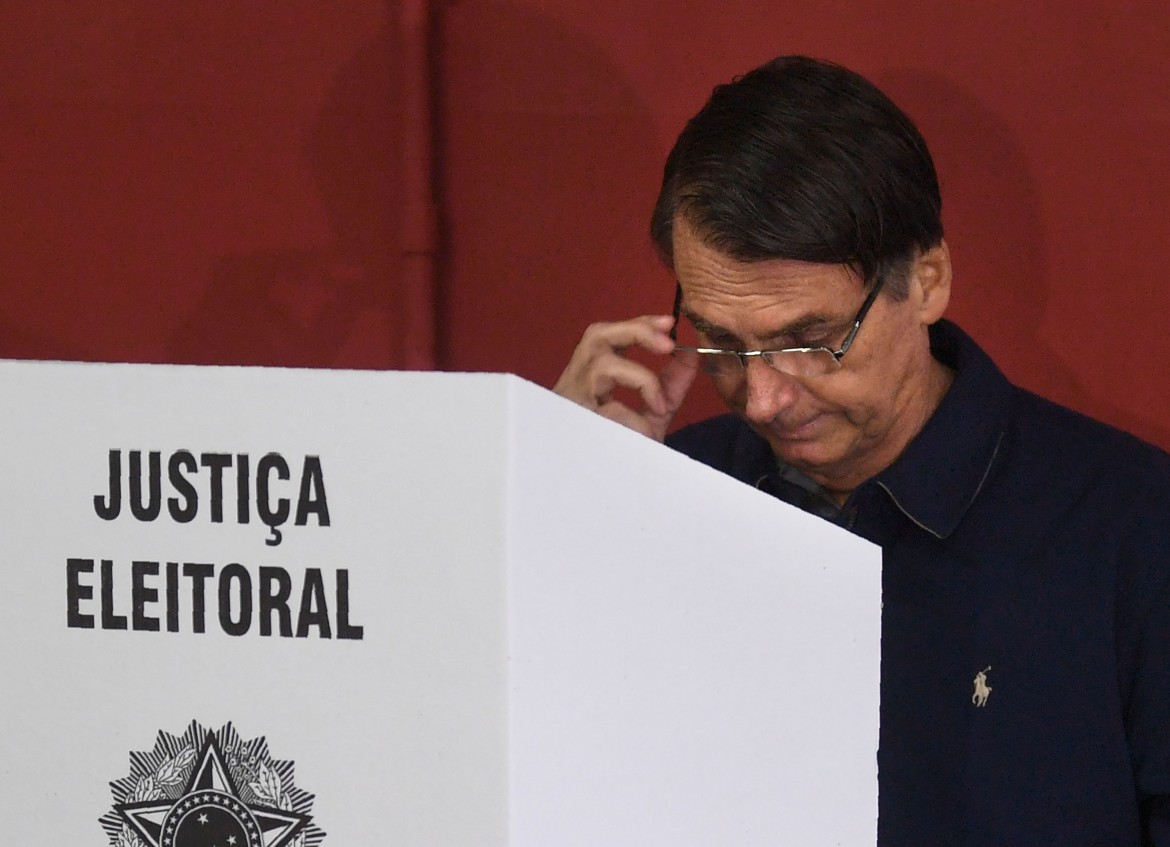Commentary
How to stop the neo-fascists from destroying Brazilian democracy
Fernando Haddad, the Workers’ Party candidate for president, pulled off a runoff election against the far-right candidate, Jair Messias Bolsonaro, who has openly advocated violence. To win, Haddad urgently needs to build a coalition.

Only after the official announcement of the results at 9 p.m. on Sunday could democracy-loving people in Brazil finally breathe a sigh of relief. The nightmare scenario had been narrowly avoided. Two hours earlier, with around 70 percent of the vote counted, the extreme-right candidate Jair Messias Bolsonaro had around 49 percent of the vote, with Lula’s appointed successor, Fernando Haddad, at just 24 percent. The final result—46 percent versus 29.3 percent—is a snapshot of a contest nothing short of existential, between two Brazils: one democratic and the other neo-fascist.
Bolsonaro getting close to winning in the first round was a catastrophe that no one would have imagined at the beginning of the election campaign. He rode a wave of rejection of a “corrupt political system” that saw the Workers’ Party (PT) as its symbol. A political outsider figure that was little known before, Bolsonaro gradually became notorious for his head-on attacks on the existing system, as well as his praise of the military dictatorship of 1964-1985 (of which his only criticism is that “it didn’t execute enough people”) and his hate-filled tirades against foreigners, blacks, women, gays and indigenous people.
The leader of the small Social Liberal Party (PSL), he is seen by his most fanatical followers—mainly young, white, affluent men, particularly active on social media—as a kind of messiah for a Brazil that has been shaken by many crises, not only economic but also ethical and ideological, and which now finds itself in the grip of an exponential increase in violence. But all in all, Bolsonaro is little more than an imperfect copy of the model offered by the global ultra-nationalist populism that has propelled figures like Donald Trump, Matteo Salvini and Viktor Orbán in Hungary. He would have had no hope of winning had he been up against Lula da Silva.
However, after the judicial branch, under the heel of the political-economic-military oligarchies, wilfully excluded the former metalworker and president from the elections (they even denied him the right to vote), the “Messiah” Bolsonaro has become the perfect candidate for the powers-that-be: beside the higher-ups in the military, he has received the support of financiers, entrepreneurs and the most powerful media in the country, such as the Globo network, ferocious opponents of Lula. Crucially, he has also gotten the approval of the most conservative sectors of the Brazilian Evangelical Church, which has brought him broad popular support, to an unprecedented extent for a candidate belonging to the white elites.
Bolsonaro is in fact a highly malleable political figure. The leader of a party that has just five representatives in Congress, and the head of a family clan that is working to amplify his slogans, he is the politician with the highest negatives in the race: 46 percent of voters, especially women, have said in polls that they would never vote for him.
“I am a former artillery captain. Why would I talk about the economy?” he replied dismissively when asked about his economic program. However, he made the cunning decision to say he would give a free hand, if elected, to the person who would be his “Super-Minister” of the Economy: Paulo Guedes, one of the “Chicago boys,” a hardline neoliberal, whose ideas—reducing public debt through privatizations, concessions to foreign capital, and the sale of public property—are music to the ears of the market interests (and to the US).
He will be up against Fernando Haddad, the PT candidate: an intellectual and a law graduate who has studied philosophy and economics. He was previously the Minister of Education and the mayor of Sao Paulo. Haddad is relatively little known, but his political and intellectual credentials burnish his image as someone devoted to democracy.
In the coming runoff against Bolsonaro, for the urgent cause of defending Brazil’s democracy, Haddad should do more than just ask for the support of the leaders of the other left-wing and social-democratic parties—such as the governor of Ceara, Ciro Gomes, Marina Silva from the Greens and Geraldo Alckmin. He should co-opt all of them into a united front that could form a coalition government (which would truly be one of “national salvation”). In short, he must give proof that he is the candidate of everyone, not only of Lula and the PT.
And he must also convince the entrepreneurs on the domestic market, those who are against the “denationalization of the productive force of Brazil,” that his government will be more like Lula’s than Dilma Rousseff’s. In essence, he will have to fight hard to earn a majority of the vote, and he cannot simply count on anti-Bolsonaro voters to win. Three weeks from now, the stakes will be nothing short of life-and-death.
Originally published at https://ilmanifesto.it/come-fermare-il-messias-neofascista-del-brasile/ on 2018-10-09
